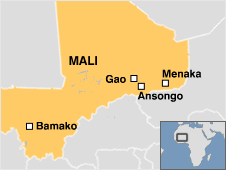Mali Feature: Making Sense of an Escalating Conflict (Wing)
 Susanna Wing writes for Foreign Affairs:
Susanna Wing writes for Foreign Affairs:
The last few months have shaken Mali to its core. In March 2012, the country's 20-year relationship with democracy ended abruptly after a group of low-ranking military officers overthrew the government. Within weeks of the coup, the National Movement for the Liberation of Azawad (MNLA), a Tuareg separatist group, seized several cities in northern Mali. Adding to the chaos, just weeks after that, fundamentalist Islamist groups, such as Ansar Dine, al Qaeda in the Islamic Maghreb (AQIM), and the Movement for Unity and Jihad in West Africa (MUJAO), overran those same cities.
Regional mediators attempted to help resolve the conflict, but their efforts yielded no tangible results. By late 2012, West African leaders had agreed to send 3,000 soldiers to halt the insurgents' advance, but the soldiers' arrival lagged. Earlier this month, the jihadist groups marched into the town of Konna. They seemed primed to make the short hop to Sevaré, which is home to a Malian military base and airstrip, and then onward to Bamako, Mali's capital.
But on January 11, France, impatient for the African-led intervention, responded to Bamako's pleas for help with air strikes and, soon after, with ground troops. The war, which already involves local, regional, and international troops, is not likely to end soon. As Bamako struggles to regain control of the northern part of the country and maintain stability in the south, observers have explained the conflict and the intervention with crude simplifications that do not reflect the reality on the ground and which point to incorrect solutions to the country's problems.
For starters, the conflict in the North is often reduced to two actors: Tuareg separatists and radical Islamists. For example, in an op-ed in The New York Times called "Nationalists or Islamists?," the Wesleyan Professor Peter Rutland argued that the core of the conflict is the "nationalist secession movement of the Tuareg people," as opposed to the actions of militant Islamists that have caught the world's attention. He refers in passing to the other ethnic groups as "the Africans who inhabit southern Mali."
In fact, the Tuareg are a minority population in northern Mali; Fulani, Songhai, Bambara, and other groups have also historically occupied much of the area. Some individuals from these groups have fled the region in the wake of the fighting, and others have joined insurgent forces. In addition, the Tuareg are not a unified bloc. Some of them have also fled the region, others have joined Ansar Dine, others the MNLA, and still others have stayed but joined neither. Finally, although over 90 percent of Malians and a vast majority of Tuareg practice Islam, most Malians agree with celebrated Malian religious leaders such as Chérif Ousmane Madani Haidara, the moderate Sufi preacher and Vice President of the High Islamic Council of Mali, and refuse to be governed by sharia law. Wahhabism has been on the rise, but the population has long practiced a more moderate form of Islam.
Simplifications of the ethnic, religious, and political dynamics of this crisis will not help to resolve the complex issues that are at its root. Thanks to 20 years of (admittedly shaky) democracy, most Malians treasure political participation as a key component of citizenship. What they want now is not less democracy -- precisely what, to their minds, the Islamists and separatists would bring -- but broader participation and greater freedom. In an op-ed in The New York Times, Oumou Sall Seck, mayor of Goundam in northern Mali, shared a common view among Malians when she wrote that "Lawless and godless men -- who hide behind Shariah and demands for Tuareg independence -- are now beating and raping women and conscripting children to fight their 'holy' war." It is no surprise that a majority want to live in a secular Mali with its current borders intact and, preferably, a legitimately elected president.
Similarly, reports have erroneously implied that France's intervention is nothing more than neocolonial adventurism. May Ying Welsh, a correspondent for Al Jazeera English, argued onDemocracy Now that France's campaign was driven by its resource interests in the region. Meanwhile, the archbishop of Accra wondered if the intervention was not another "colonisation attempt."
To be sure, the weakness of the Malian state is tied, in part, to the legacy of French colonialism. And critics are not wrong to point out that France has important strategic and economic interests in the region. (France's nuclear power plants feed off the uranium mines in nearby Niger.) But the idea that these factors drove France's intervention is incorrect.

 Monday, January 21, 2013 at 7:47
Monday, January 21, 2013 at 7:47
Reader Comments